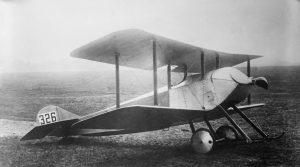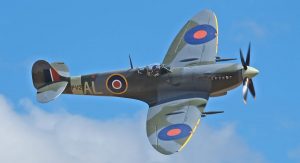Finest Hour 185
Churchill, Air Power, and Arming for Armageddon
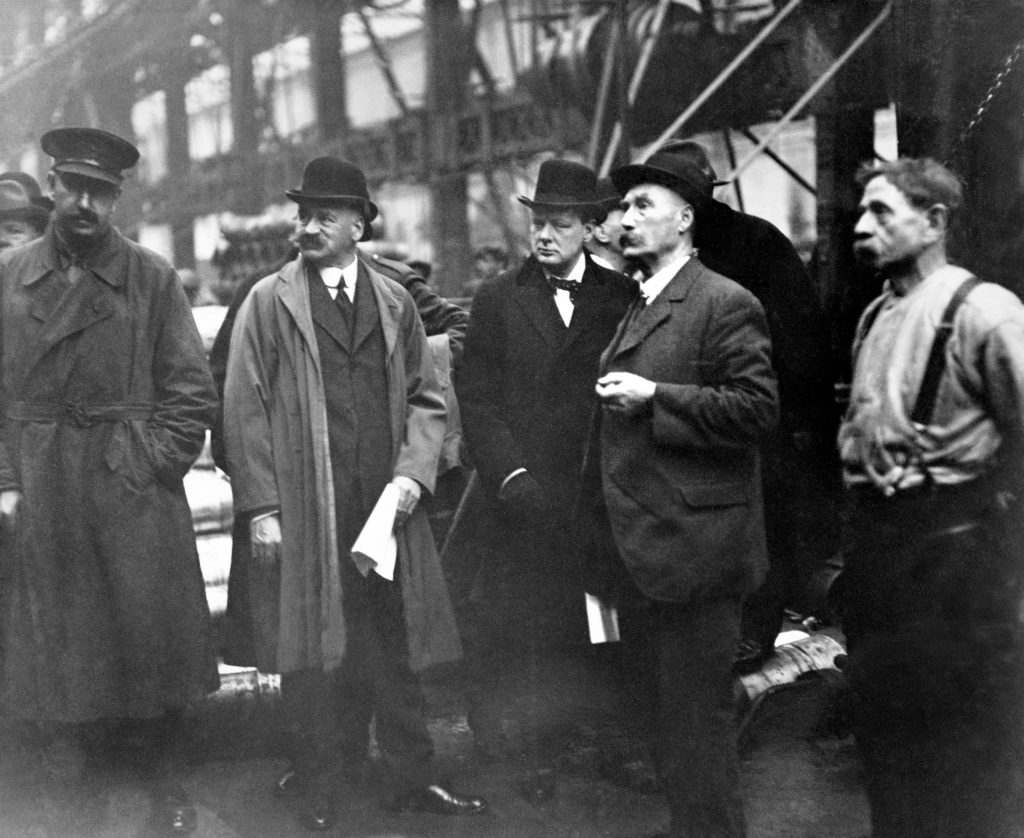
Winston Churchill as Minister of Munitions at Beardmore's Gun Works Glasgow, 8 October 1918
August 18, 2019
Finest Hour 185, Third Quarter 2019
Page 12
By John H. Maurer
John H. Maurer is the Alfred Thayer Mahan Distinguished Professor of Sea Power and Grand Strategy at the US Naval War College in Newport, Rhode Island.
Winston Churchill was an air power enthusiast. He saw early on that aircraft were transforming the international balance of power and the strategic environment. Command of the air would become a requirement to provide for the security of Great Britain and its empire, just as naval mastery had been in earlier times. As First Lord of the Admiralty before and at the outbreak of the Great War, he championed the development of Britain’s air strength. During the war, Churchill led the Ministry of Munitions, presiding over the manufacture of aircraft and weapons for the Royal Air Force (RAF). After the war, he served as Air Minister. Churchill would write: “Thus it happens to have fallen to my lot to have witnessed, and to some extent shaped in its initial phases, the whole of this tremendous new arm, undoubtedly destined to revolutionize war by land and sea.”1 In the intensely competitive international environment of the period between the wars and during the second great Armageddon, Churchill would bring this extensive experience of leadership to bear in building up Britain’s air strength. He wanted Britain to lead in the science, technology, and practice of aerial warfare, to stand as the world’s leading air power.
Churchill was so much the enthusiast for air power that he sought to learn how to fly. Although his wife Clementine disapproved of this endeavor, Churchill persisted in pursuit of his wings. Much to his disappointment, he did not possess the aptitude to be a pilot. Still, he seized upon opportunities to go up in the air. He came much too close to death in flying accidents on several occasions. On one occasion during the First World War, while flying over the English Channel, his aircraft lost power, and it seemed as if he would crash into the water. The aircraft engine restarted, and Churchill avoided death. Soon after this episode, he described this near-death experience to the British press magnate Sir George Riddell, who recorded their conversation in his diary:
We talked much of flying. He [that is, Churchill] flies often as an amusement now-a-days. On his last flight across the Channel the engine gave signs of failure. He described his feelings. “I saw that things looked serious. I knew that if the engine just ceased to cough we should fall into the sea. We were too low down to have an opportunity to rectify matters. I wondered if I could unstrap myself and unstrap the pilot, and how long the machine would float and how long I could swim after that.” “Were you afraid of death?” I said to him. “No” he replied, “I love life, but I don’t fear death. Beyond the feelings I have described I felt a curious calm come over me.”2
This conversation captures Churchill’s ability to remain steady in the face of grave danger. He did not lose his nerve despite harrowing circumstances.
Fortunately, Churchill did not meet his death in an airplane crash. Although remaining an air enthusiast throughout his life, he relented and gave up on the ambition to achieve his pilot’s wings; he would leave the flying to others, better able to take the controls in the air.
The Two As
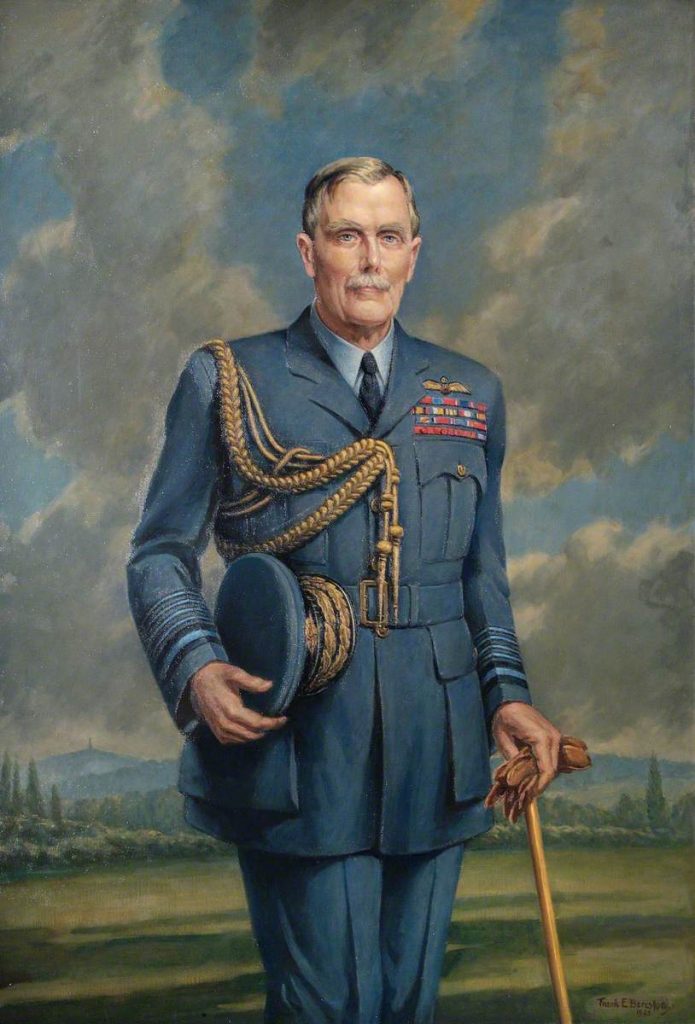
As Minister of Munitions, Churchill showed himself a forceful advocate for the rise of Britain as an air power. In 1918, under Churchill’s leadership, British factories produced in excess of 32,000 aircraft, more than double the previous year’s output.3 He pressed the strategic value of air power against an Army’s leadership who wanted to give priority to fighting Germany on the ground rather than in the air. Churchill lamented: “There is no doubt that if [Field Marshal Sir Douglas] Haig had to choose between 50,000 men for the infantry and 50,000 men for the Air Force, he would choose 50,000 men for the infantry.” Churchill’s efforts at the Ministry of Munitions proved a huge success: Britain possessed the world’s strongest air force by the war’s end. Britain’s superiority in the air over the battlefields of France and Belgium proved an important factor in the defeat of Germany during the closing year of the Great War. Churchill thus understood the industrial foundation for waging war in the air. Alas, British governments of the 1930s did not take advantage of Churchill’s considerable experience in managing industrial production of weaponry by putting him in an executive position where he might have expedited rearmament against Nazi Germany.
Air power formed part of Churchill’s strategic design for defeating Germany in the two world wars. To his top leadership at the Ministry of Munitions, Churchill made plain the strategy that guided his actions: “There are only two ways left now of winning the war, and they both begin with A. One is aeroplanes and the other is America.”4 Churchill grasped a fundamental strategic truth that Britain’s ability to defeat Germany—whether it was led by the Kaiser and his generals, or by Hitler—required air power and American strength. This understanding of the international strategic environment—the growing importance of both air power and the special trans-Atlantic partnership with the United States—guided Churchill’s strategy in both world wars.
The New Threat
With the Nazi seizure of power, Churchill did not hesitate to warn that a competition in air strength would start up between Britain and Germany. Hitler’s takeover in Germany destroyed one of the main pillars supporting the peace in Europe. An extremist nationalist regime, led by a man who envisioned himself as a Nordic war god, made renewed German aggression practically inevitable. Churchill quickly recognized the danger. On a tour of Germany during 1932, he witnessed firsthand the extremist nationalist demonstrations of German youths, marching in support of the Nazi movement. The increased threat posed by Nazi Germany changed dramatically the whole international strategic environment, which Churchill correctly called a gathering storm. Weathering this storm would require a protective umbrella of air power.
In this new international environment, Churchill stood in the forefront of those advocating a rapid and huge rearmament effort to deter Germany from undertaking wars of conquest. Not long after the Nazis took power, Churchill warned about the ramifications for Britain brought about by the change of regime in Germany:
One of the things which we were told after the Great War would be a security for us was that Germany would be a democracy with parliamentary institutions. All that has been swept away. You have dictatorship—most grim dictatorship. You have militarism and appeals to every form of fighting spirit.5
Churchill’s rhetoric echoes the language of Shakespeare: a most grim dictatorship would commit murder most foul, before Hitler and his murder machine was destroyed by the avenging nations of the Grand Alliance in the tragedy that was the Second World War.
The Nazi regime came into power committed to gain strategic advantage by building up Germany’s air power. Hitler’s wars of conquest would succeed or fail depending upon whether or not Germany possessed air superiority over the battlefield. The Nazi regime moved very quickly to develop the German air force, in direct violation of the Versailles Treaty. Hitler felt no respect for treaties that stood in the way of his ambitions to dominate Europe and establish Germany as a world power. The restrictions of Versailles prevented Germany from having a competitive air force. As a consequence, Germany initially lagged behind Britain in air strength and manufacturing capacity. The historian Adam Tooze writes: “In 1932 the German aircraft industry employed 3,200 people and had the capacity to produce no more than a hundred aircraft per year.” All that would change rapidly, as the regime lavished resources on the development of Germany’s air power. At the outbreak of war, the German aircraft industry employed more than 250,000 workers “and was capable of turning out every year more than 10,000 of the most sophisticated combat aircraft in the world.”6 The German buildup in air strength represented a revolution in the European balance of power that would pave the way for Nazi conquests.
The Prophet of Truth
Churchill was outspoken in calling attention to this danger and for the need to build up British air power to stay ahead of Germany in the emerging arms race. He feared the political and strategic consequences if the RAF fell behind Germany in combat power. He understood that to lose the prewar arms race might prove tantamount to losing the war. He was under no illusions that Britain could conduct a successful foreign policy and remain secure in dealing with Hitler if British leaders had only a weak military hand to play.
In The Gathering Storm, Churchill argued that the failure to stay ahead of Germany in the arms race contributed to the war’s outbreak. He contended: “by extreme exertions we could have preserved the air strength on which our independence of action was founded. If Great Britain and France had each maintained quantitative parity with Germany they would together have been double as strong, and Hitler’s career of violence might have been nipped in the bud without the loss of a single life.”7 Overwhelming air superiority in the possession of Britain and France provided the basis for preventing war.
Even if Hitler’s manic will to wage war ruled out deterring him, Churchill’s strategic prescription of staying overwhelmingly strong in the air would have better prepared Britain and France for the fighting to come. The German army would have faced a much tougher fight against France in 1940 if it had fought in a more hostile air environment. Would Germany have been able to knock out France if the German air force had been outmatched? The battles of the Second World War would show that air superiority was a prerequisite for successful ground offensives. Armies lacking air superiority were vulnerable to air assault and generally forced on the defensive. Germany’s odds of quickly defeating France, as occurred in 1940, would have been greatly reduced if Britain and France had dominated in the air.
In advocating rearmament, Churchill gave close attention to the threats posed on the sea and in the air to British security. He argued that Britain needed superiority over great power challengers in these strategic domains. He grasped that protection of the British homeland from air assault provided the foundation for Britain’s security and international standing in an increasingly hostile world. He urged in Parliament: “We ought to have a large vote of credit to double our Air Force; we ought to have it now, and a larger vote of credit as soon as possible to redouble the Air Force.”8 Peace and security required winning the arms race against Germany.
Churchill urged a buildup in naval and air strength so that Britain would not confront rising international challengers from a position of weakness. Churchill would famously highlight this connection between armed strength and appeasement later in life, during the Korean War. “Appeasement in itself may be good or bad according to the circumstances,” he stated. “Appeasement from weakness and fear is alike futile and fatal. Appeasement from strength is magnanimous and noble, and might be the surest and perhaps the only path to world peace.”9 Falling behind Germany in armaments put Britain in a dangerous strategic position of having to give in to Hitler’s geopolitical ambitions or to fight him from a position of military weakness.
Political Opposition
Britain certainly possessed the industrial, financial, demographic, and scientific resources to build a powerful air force. Churchill was confident that Britain could stay ahead of Germany in the arms competition. After all, he directed as Minister of Munitions the manufacture of large numbers of aircraft during the Great War. The Second World War would show again how Britain could renew its strength as an air power. Churchill had no doubt, too, that the British public would “have sustained the measures necessary for national safety.”10
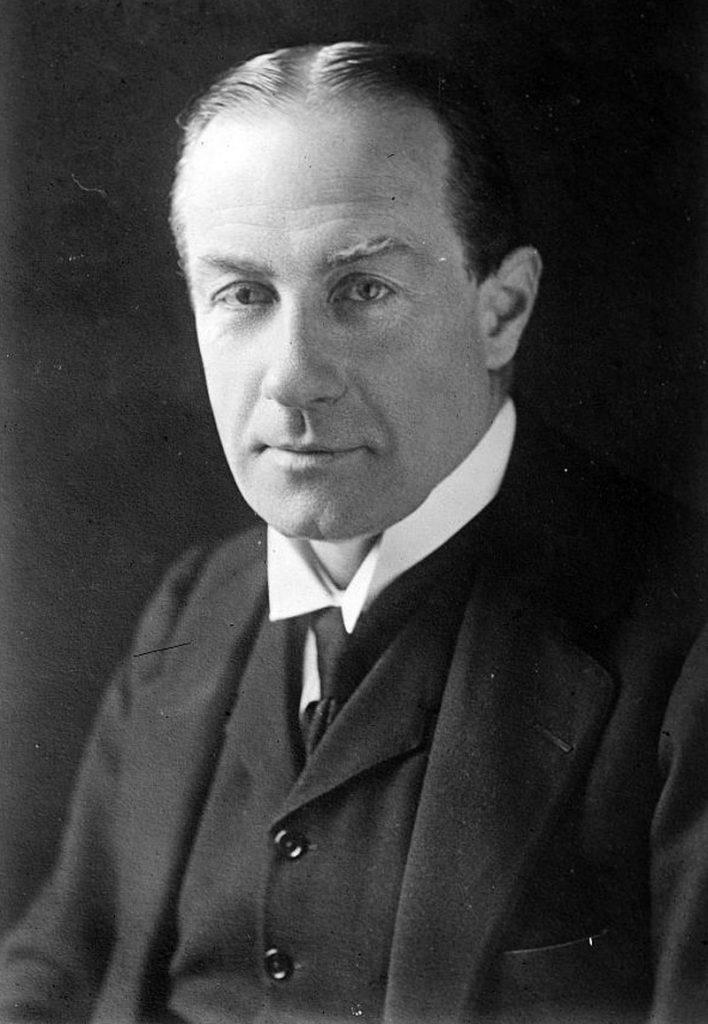
Mobilizing these resources, however, required political will and leadership. The British governments in power during most of the 1930s wanted to avoid having to follow the strategic prescriptions proffered by Churchill of arming against Germany. The leaders of the National Government were not blind to the air menace. Stanley Baldwin famously stated that “the bomber will always get through.” Neville Chamberlain sought to expand the RAF as a deterrent against Hitler, first by building up a bomber force and later by strengthening capabilities to defend against air attack. Appeasement was viewed as an alternative to an arms buildup. Britain’s leaders wanted to avoid the unpalatable reality of having to wage an arms race, which they believed would be an inevitable precursor to war. The efforts made by the National Government, to be sure, provided the bare minimum of strength to hold on in 1940.11 Still, as Churchill maintained at the time and later, the government could have done more to prepare Britain for war if a smashup with Hitler could not be avoided.
If Baldwin and Neville Chamberlain could have done more, the opposition Liberal and Labour parties acted in an even more irresponsible way in condemning the government’s steps toward rearmament. Clement Attlee, the leader of the Labour Party, denounced the government’s aim of maintaining parity between Britain and Germany in air strength, of not letting the German air force get ahead of the RAF. In the Commons, Attlee spoke for Labour: “We deny the need for increased air armaments. We deny the proposition that an increased Royal Air Force will make for the peace of the world and we reject altogether the demand for parity.”12 When Churchill called for a large increase in the strength of the RAF, he was attacked for holding outlandish views. A former colleague in government, Sir Herbert Samuel, criticized him for demanding large increases in defense spending “without giving the smallest reasons why this colossal expenditure should immediately be undertaken. That is rather the language of a Malay running amok than a responsible British statesman. It is rather the language of blind and causeless panic.”13 Churchill was not blind, and he had good cause to call for the maximum effort in building up British air strength for a coming trial with Nazi Germany.
Churchill also gets criticized for supporting his friend the “Prof,” Frederick Lindemann, in government efforts to research, develop, and acquire an air defense system during the 1930s. The dispute between Lindemann and Sir Henry Tizard has become legendary. Today, Churchill’s actions represent what is called “red teaming”—a leadership tool to challenge assumptions and efforts within an organization. The use of red teaming often generates controversy, as leaders of organizations typically do not relish having their projects subject to thorough criticism and questioning, especially from outsiders. The disputes within organizations can sometimes become deeply personal because they affect questions of leadership and professional reputation. This red-team method, however, formed part of Churchill’s leadership style for exploring and evaluating alternative courses of action. Churchill’s aim was to spur innovation and hurry along the British air defense effort. Churchill’s support of Lindemann, while antagonizing some of the government’s scientific advisors, did not delay the building of radars networked into an air defense system to provide warning of an approaching aerial assault of the British homeland.
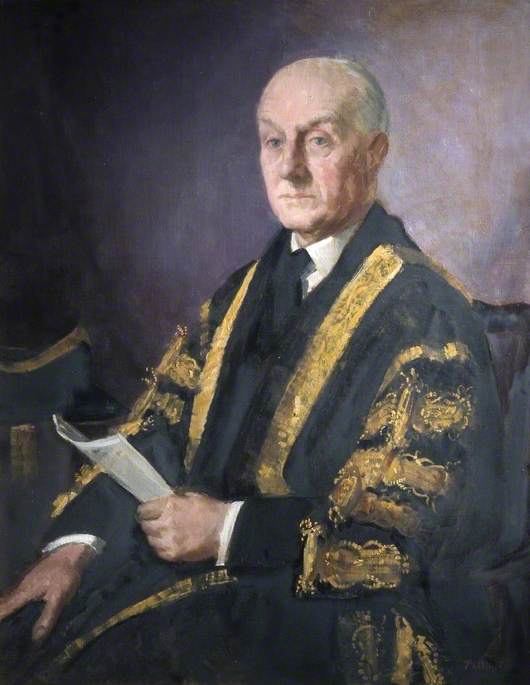
While he was a political opponent of Churchill, Viscount Templewood (Sir Samuel Hoare) also believed Britain could have earlier done more to build up Britain’s air strength. A former minister for air power, Templewood sought to defend the actions of the National Government in his memoir Nine Troubled Years. Nonetheless, he conceded that Britain’s leaders erred in failing to increase the RAF. Templewood admitted: “The inescapable fact was only too obvious, that we had started rearmament too late.” In particular, he believed that a “single year would have made a vast difference” if Britain had adopted “an intensified expansion of the Air Force.” He judged Ramsay MacDonald and Stanley Baldwin flawed leaders who did not provide the requisite drive to meet Hitler’s challenge.14 Coming from one of Churchill’s political enemies, Templewood’s assessment that British leaders could and should have done more to build up Britain’s air power is damning.
Time Lost
While Churchill lamented the slow pace of rearmament, he also maintained that Britain would have been better off fighting Germany in 1938 when Hitler threatened to attack Czechoslovakia instead of delaying and going to war a year later. In The Gathering Storm, Churchill argued: “I remain convinced…that it would have been better in all circumstances…to fight Hitler in 1938 than it was when we finally had to do so in September 1939.”15 On the other side of this argument are those who contend that Britain’s air defenses were weak in 1938. The rationale offered is that Munich bought time for Britain to prepare better to fight in the air. Of course, Britain did get stronger in air power in the year between Munich and the outbreak of war. This counterargument, however, is misleading because it only focuses on British weakness. A much better approach to analyzing the strategic position is a net assessment, a comparative examination of both sides, the forces available to Britain in relation to Germany. When that net assessment is done, Germany’s situation looks weak.
In 1938 Germany had no air force capable of doing major damage by bombing the British homeland. In the initial stages of the fighting, the German air force would need to stay concentrated on supporting the army, first in conquering Czechoslovakia before turning on France. The Luftwaffe would have its hands full supporting ground operations in Central and Western Europe before being able to bomb Britain. Britain’s homeland, then, was in no imminent danger of a major air attack if it went to war in 1938.
Furthermore, geography matters. Inflicting major damage on the British homeland required that Germany’s air force possess bases along the Channel in the Netherlands, Belgium, and France. German aircraft did not have the range to strike Britain with decisive effect from bases in Germany. To acquire those forward bases, the German army would first have to seize the Low Countries and knock France out of the war. A successful major land offensive was a precondition for a war-winning air assault on Britain. Only by first winning on land, conquering Western Europe, could Germany’s air force have the capability to inflict serious damage on the British homeland.
In addition, once at war, Britain could accelerate the buildup of its armed forces. While the RAF certainly got stronger between 1938 and 1939, so too did the German Luftwaffe. British air rearmament would have increased even more under wartime conditions if Britain had gone to war in 1938. This examination of the balance of forces supports Churchill’s contention that Britain should have drawn a redline at the time of the Munich crisis and, if Hitler stormed ahead and invaded Czechoslovakia, declared war rather than concede the dismemberment of the Czech state. Instead of improving Britain’s relative strategic position with regard to Germany, the year’s delay on balance favored Hitler’s ambitions. Hitler told his generals in August 1939: “England is vulnerable to air attack. The English air force itself has only about 130,000 men, whereas we have 390,000.”16 Churchill was proved correct that British weakness in the air would spur Hitler to carry out his aggressive design for hegemony in Europe on his drive to establish a Nazi superpower in the global arena.
The Second World War
The prewar arms race had profound strategic implications for the fighting once the war began. Germany’s ability to gain air superiority over much of the Western Front during the spring of 1940 was a critical enabler of the German defeat of France. German armored columns could not have raced to the Channel if they had been forced to operate in a hostile air environment. Where the Germans faced resistance in the air, their operations faltered. At Dunkirk, for example, Britain’s ability to contest the air space over the Channel enabled the miracle of deliverance, the evacuation of British and French ground forces, to occur. That more than 300,000 soldiers escaped the German encirclement—instead of the initial estimate that only 30,000 could be evacuated—hinged on the aerial umbrella unfolded by the RAF.
Britain’s ability to stand up to the German air assault through the rest of 1940 proved a turning point in the war. Ambassador Joseph P. Kennedy took a gloomy view of Britain’s chances of winning the coming Battle of Britain. He wrote his son, the future President John F. Kennedy: “The whole crux of the matter is…the strength of the German air force….If they have the strength they pretend to have and they come over and knock off the British air force, it will not make the slightest difference what land precautions the British have made. No country can stand up unless it has air parity with another country.”17 The Soviet Ambassador Ivan Maisky recorded in his diary that Kennedy “thinks it utterly inevitable that England will be almost completely destroyed by air raids.”18 The British military chiefs, in their strategic appraisal, also asked: “Whether the morale of our people will withstand the strain of air bombardment.” Uncertainty hung over the question of whether the RAF could blunt Germany’s air offensive against the British homeland. The indecisiveness of the British governments during the 1930s in racing to stay ahead of Germany in air power called into question Britain’s ability to keep fighting after the defeat of France.
Churchill and the British people were fortunate that they possessed an outstanding military commander in Air Chief Marshal Sir Hugh Dowding to conduct the Battle of Britain. The aerial contest became an attrition battle, fought out over the British skies rather than in the mud of Flanders. Both air forces suffered heavy casualties in their constant clashes. Germany lost this battle of attrition. Dowding’s cool leadership and superb handling of the forces under his command accomplished the mission of defeating the German offensive to break down Britain’s defenses. The “few” held the line and grew stronger as the battle progressed.
Yes, the bomber did get through, as Stanley Baldwin predicted. Nothing can conceal the heavy loss of life suffered by the British civilian population. By the end of 1940, German bombing raids killed about 25,000 British civilians. To put that number in some perspective, this loss of life amounted to eight times the fatalities suffered by the United States on September 11, 2001. The few of the RAF could not prevent the many from suffering. British civil defense measures contributed greatly to Britain’s resilience when hit by German bombs. The courage of the British people provided an answer to the question posed by the British military chiefs of whether they could withstand the strain of air bombardment. Not only could the British people take this horrific punishment, they also could bring about a renewal of Britain’s power to take the fight to the enemy. Britain’s RAF would grow stronger and mete out great loss on the German armed forces and Germany’s cities during the war.
Churchill’s leadership stood as a decisive factor in winning the air struggle against Nazi Germany. Before the war, out of government, he raised his voice to spur rearmament. Would the National Government, so committed to avoiding an expensive arms race, have taken the tentative steps that it did to rearm if Churchill had not spoken out so forcefully about the importance of building up British air power? When the storm broke upon them, the lion heart of the British people drew courage and hope from Churchill’s roar. Air power, the determination of the British people, and Churchill’s will to extirpate the Nazi tyranny turned the tide of war.
Endnotes
1. Winston S. Churchill, Thoughts and Adventures (London: Thornton Butterworth, 1932), p. 181.
2. Diary entry, 4–6 September 1918, Riddell Diaries, Ad. Ms. 62982, British Library, ff. 55–66. Churchill would write about this flight in “In the Air,” Thoughts and Adventures, pp. 187–88.
3. Stephen Broadberry and Peter Howlett, “The United Kingdom during World War I: Business as Usual?” in Stephen Broadberry and Mark Harrison, eds., The Economics of World War I (Cambridge: Cambridge University Press, 2005), p. 212.
4. Martin Gilbert, Winston S. Churchill, vol. IV, The Stricken World (Boston: Houghton Mifflin, 1975), p. 44.
5. Churchill speech in Parliament, 13 April 1933, Robert Rhodes James, ed., Winston Churchill: His Complete Speeches, vol. V (New York: Chelsea House, 1974), pp. 5260–66.
6. Adam Tooze, The Wages of Destruction: The Making and Breaking of the Nazi Economy (London: Allen Lane, 2006), p. 125.
7. Winston S. Churchill, The Second World War, vol. I, The Gathering Storm (Boston: Houghton Mifflin, 1985 paperback edition), p. 103.
8. Churchill speech in Parliament, 7 July 1934, Complete Speeches, pp. 5376–77.
9. Churchill speech in Parliament, 14 December 1950, Martin Gilbert, Winston S. Churchill, vol. VIII, “Never Despair” (London: Heinemann, 1988), pp. 573–75.
10. Churchill, Gathering Storm, p. 106.
11. One defense of the National Government was offered by A. W. Baldwin, My Father: The True Story (London: George Allen and Unwin, 1955), pp. 180–287.
12. Quintin Hogg, The Left Was Never Right (London: Faber, 1945), p. 53.
13. Sir Herbert Samuel speech, 13 July 1934, Martin Gilbert, Winston S. Churchill, vol. V, Prophet of Truth (Boston: Houghton Mifflin, 1977), p. 552.
14. Viscount Templewood, Nine Troubled Years (London: Collins, 1954), pp. 25–36 and p. 332.
15. Churchill, Gathering Storm, p. 207.
16. Hitler to German military leaders, 22 August 1939, J. Noakes and G. Pridham, eds., Nazism 1919–1945, vol. III, Foreign Policy, War and Racial Extermination (Exeter: Exeter Studies in History, 1988), p. 471.
17. Joseph Kennedy to John F. Kennedy, 2 August 1940, in Amanda Smith, ed., Hostage to Fortune: The Letters of Joseph P. Kennedy (New York: Viking, 2001), pp. 453–54.
18. Gabriel Gorodetsky, The Maisky Diaries: Red Ambassador to the Court of St. James, 1932–1943 (New Haven: Yale University Press, 2015), pp. 288–89.
Subscribe
WANT MORE?
Get the Churchill Bulletin delivered to your inbox once a month.


